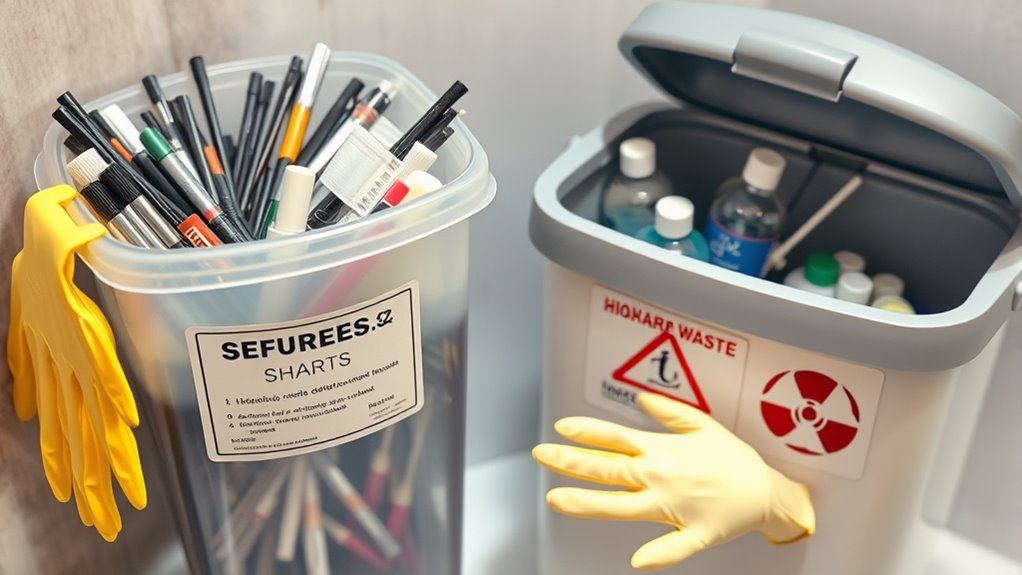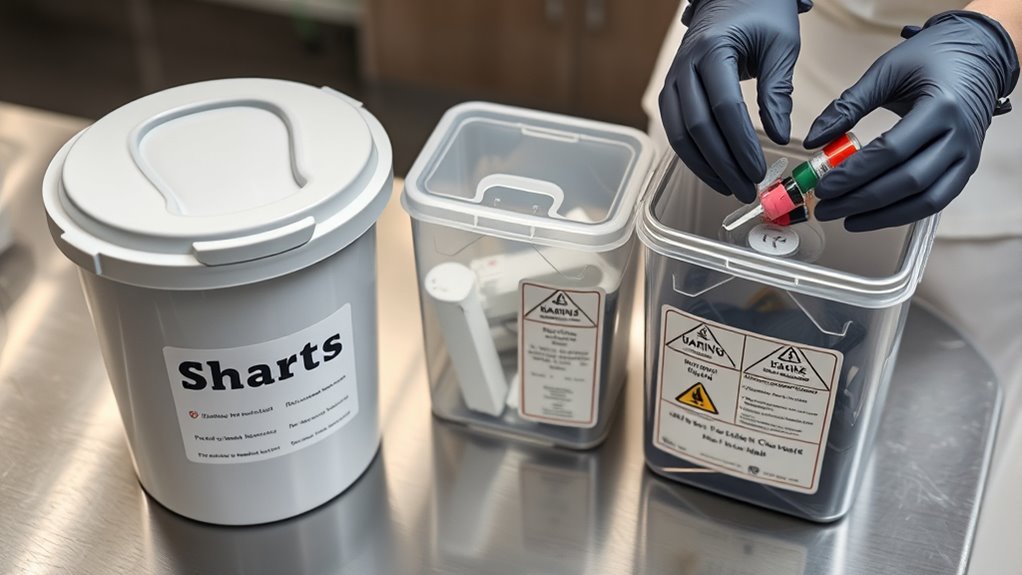To dispose of nail salon waste safely, you should store chemicals in labeled, leak-proof containers away from heat and flames, following local regulations. Never pour chemicals down drains or into trash; instead, use licensed disposal services for hazardous materials. For sharps like used files and broken glass, place them in puncture-proof containers and seal them properly before disposal. Proper waste management helps protect health and the environment—continue to learn more about safe practices to stay compliant.
Key Takeaways
- Store chemicals in secure, labeled, leak-proof containers away from heat and open flames.
- Use licensed waste disposal services for chemicals, avoiding pouring down drains or into trash.
- Dispose of sharps in puncture-proof, sealed containers according to local health guidelines.
- Follow all local, state, and federal regulations for chemical and sharps waste disposal procedures.
- Maintain detailed records of waste disposal activities to ensure proper compliance and safety.

Proper disposal of nail salon waste is vital to protect both the environment and public health. Nail salons generate a variety of waste, including chemicals, sharps, and other hazardous materials that require careful handling. Failing to dispose of these items properly can lead to environmental contamination, health risks for workers and clients, and legal issues. That’s why understanding how to handle hazardous waste and guaranteeing safe disposal practices is essential for any salon owner or technician.
Proper disposal of nail salon waste safeguards health and the environment.
Hazardous waste in nail salons mainly comes from chemicals like acetone, formaldehyde, and various acrylics and solvents. These substances are not only toxic but can also seep into soil and water if discarded improperly. To prevent this, you need to identify waste that qualifies as hazardous according to local regulations and handle it with care. Properly labeled containers are key; never mix chemicals in unmarked or inappropriate containers. When storing hazardous waste, keep it in secure, leak-proof containers away from heat or open flames, and guarantee they are clearly labeled with the contents and hazard warnings. This minimizes accidental exposure and makes safe disposal more straightforward.
Safe disposal of hazardous waste involves following local, state, and federal regulations. Many jurisdictions require you to use licensed waste disposal companies that specialize in handling chemical waste. These professionals have the expertise to transport and process hazardous materials safely, preventing environmental contamination. Avoid pouring chemicals down drains, into trash bins, or on the ground, as this can cause serious pollution problems. Instead, coordinate with licensed disposal services to pick up and treat your waste properly. Keeping detailed records of waste disposal is also vital; it proves you’re complying with regulations and helps prevent future liabilities.
Sharps like broken glass, used files, or needles require special attention. These items are considered infectious waste and pose a physical injury risk. Always dispose of sharps in puncture-proof, leak-proof containers specifically designed for sharps disposal. Never toss them loose into regular trash. Once filled, seal the container securely and label it clearly. Check with your local health department for guidelines on how long to store sharps before disposal and the designated disposal sites or pickup schedules. Proper sharps disposal not only keeps your staff and clients safe but also prevents the spread of infections. Additionally, utilizing proper disposal methods for water-based chemicals can help minimize environmental impact and ensure compliance with water safety standards.
Frequently Asked Questions
Are There Specific Disposal Containers for Nail Salon Chemicals?
You should use specialized disposal containers for nail salon chemicals to guarantee safety and compliance. These containers are designed for chemical storage and help prevent leaks or spills that could harm people or the environment. Always choose approved disposal containers labeled for hazardous materials, and follow local regulations for chemical disposal. Proper chemical storage and disposal containers protect your staff, clients, and the planet from potential hazards.
How Often Should Sharps Be Disposed of in a Salon Setting?
You should dispose of sharps frequently, ideally after each use, to maintain salon hygiene protocols. Regular sharps disposal prevents injuries and contamination, protecting both staff and clients. Follow your local regulations for sharps disposal frequency, but in general, don’t wait until the container is full. Prompt disposal minimizes risks and ensures a safe, clean environment. Always use approved sharps containers and adhere to safety guidelines for proper disposal.
Can Regular Trash Be Used for Disposing of Chemical Waste?
Imagine a salon owner mistakenly disposes of chemical waste in regular trash, risking environmental harm. You shouldn’t use regular trash for chemical waste because it violates disposal guidelines and can contaminate recycling options. Always follow proper disposal guidelines and use designated containers for chemicals. This helps protect the environment and ensures safety. Proper disposal is essential, and regular trash isn’t a safe or legal option for chemical waste.
What Are the Legal Requirements for Hazardous Waste Disposal?
You need to follow legal compliance and regulatory standards when disposing of hazardous waste. This means you must identify waste as hazardous, use proper containers, and follow specific disposal procedures. Check local, state, and federal regulations to make certain you’re meeting all requirements. Never mix waste types, and always label containers clearly. Proper disposal helps prevent environmental harm and keeps your salon compliant with the law.
How Can Salons Ensure Compliance With Local Waste Disposal Regulations?
To stay compliant with local waste disposal regulations, you should focus on proper waste labeling and staff training. Make sure all hazardous waste is clearly labeled according to local guidelines, so everyone knows what’s what. Regularly train your staff on waste handling procedures, emphasizing safety and regulation adherence. Keeping documentation up-to-date and consulting local authorities can also help guarantee your salon remains compliant and avoids penalties.
Conclusion
Remember, safely disposing of nail salon waste protects both your community and the environment. It’s easy to overlook the danger of tiny chemicals and sharp tools, but these hazards can cause serious harm if mishandled. Think of waste disposal as a delicate dance—balancing cleanliness with caution. By taking responsible steps today, you prevent hazards from lurking in everyday routines, turning a simple act into a powerful gesture of care for your surroundings and yourself.









